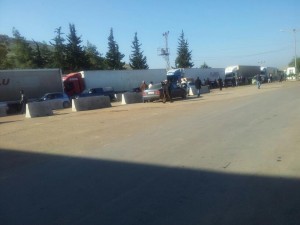Syrian reconstruction, made in Turkey

Rasha Rami
Anyone approaching the Bab Al-Hawa border crossing between Turkey and Syria is reminded of times past when trade between the two countries was thriving.
Today, hundreds of trucks loaded with goods can be seen parked on the side of the road waiting to pass into Syria, but there are no trucks coming from the Syrian side into Turkey.
What is striking is not only the number of trucks, but also the nature of the goods being transported, most of which consist of steel, cement and other building materials.

Over 150 trucks were in line to cross into Turkey one day recently; most of the drivers had gotten out to wait for the gate to open before they continued on to their destinations.
“Waiting at the border isn’t a problem – it’s normal for us, especially because the cargo will not be damaged,” says Mohammed, a Turkish driver who says he has been waiting two days at the border. “But the problem is when they tell us to go back, after a long wait, because of security problems on the other side of the border.”
Tchadhas, another driver, sees his work as a way of supporting the Syrian people, adding that he has been to Idlib at least three times bringing cement.
“Support for the revolution and working with the rebels is not limited to providing arms,” he says. “I am a Turkish citizen, but as far as I’m concerned entering Syria despite the danger is my contribution to the revolution.”
On the other hand, some drivers felt that merchants and contractors were exploiting the crisis because selling and transporting building materials is hugely profitable at times like this, and will become even more so after the war ends.
The extent of the destruction suffered by many towns and cities in Syria means there will be a large demand for reconstruction materials, says Selim, a Turkish driver.
“When I was transporting goods I could see destroyed villages like Azzaz and Idlib, in addition to what we hear of the devastation happening in the city of Aleppo,” he says.
But contractors in Turkey say the flow of materials over the border is hurting the domestic construction market.
Hekmet Johnsol, who owns the Antioch-based real estate and construction company oz Burak, says business has fallen in the last two months because suppliers of building materials prefer to export their goods to Syria where they are able to sell at higher prices.
“Some of them stockpile materials and then sell them to construction merchants in Syria who are also storing them in anticipation of the end of the crisis in order to make a quick profit,” says Johnsol.
The Turkish and Syrian merchants to whom Johnsol refers can easily be found at the Bab Al-Hawa crossing where they wait for several hours to pass through customs, taking advantage of the relative calm that prevails from time to time.
“Reconstruction is nearly impossible in light of the constant shelling and daily bombings in the liberated areas, so we store the goods in hopes of selling them in the future, and even if we do so at a higher price, these materials are ultimately in the interest of nation-building,” says Mukhtar, a Syrian trader.
Suleiman, an employee with a Turkish company that specializes in steel construction materials, thinks that prices are reasonable, especially for goods sold in Syria, but also denies that that suppliers raise prices on goods sold in Turkey, emphasizing his commitment to his Turkish clients.
Suleiman adds that the export of goods to Syria has actually increased since the start of the uprising.
“In the past, our goods were often undesirable in Syria, but today and in the light of [the crisis] and the difficulties of shipping, some of the factories have stopped production, opening new sales channels,” he says.
Construction materials are not the only active trade between Turkey and Syria; the expansion in the transport of goods also includes some types of food, cleaning materials and other consumer goods.
Some of the merchants on the border say the increase in the flow of goods from Turkey is due to the restrictions on movement between villages controlled by the Free Syrian Army and other areas not under their control, as well as frequent robberies on the roads. Therefore, they say, merchants prefer to pay exorbitant prices for Turkish goods rather than risk theft.
Six days after this reporter’s first encounter with Tchadhas, he is at the same place. There are only about five trucks in line in front of him, and he is visibly eager to cross the border, despite the difficulties he has faced on previous journeys. By now, he knows the armed groups manning the checkpoints, and they have assured his safety and that of his goods and his truck.
Throughout the interview, Tchaddas remains adamant about his duty to his Syrian neighbours.
“I will cross into Syrian territory today, God willing, and I’m willing to cross again, not only for work and for transporting goods, but for the adventure I will tell my friends later,” he says. “They will see me as one of the heroes of the events in Syria.”
